Australia’s startup scene is thriving, fueled by innovation, government support, and a growing network of tech-savvy entrepreneurs. From AI-driven automation to sustainable tech solutions, several emerging Australian startups are redefining industries and setting new benchmarks in efficiency and scalability.
But what makes a software or tech startup stand out in today’s competitive landscape? It’s not just about building a product; it’s about solving real-world problems smarter, faster, and more efficiently. Issues that don’t usually surface until we see other people solving them.
So let’s make this easy for you.
Whether you’re looking to launch your first venture or pivot to a more tech-driven approach, understanding the most promising startup business ideas in Australia can help you make informed decisions.
This article explores innovative software and tech startup ideas in Australia that are not only gaining traction here but also have the potential to disrupt global industries and drive long-term growth.
The Australian Startup Landscape
Australia’s startup ecosystem has evolved into a dynamic and influential force within the global tech landscape. As of 2025, this sector is characterized by a well-tested set of tech business ideas, robust investment activity, a focus on sustainable growth, and a surge in technological innovation.
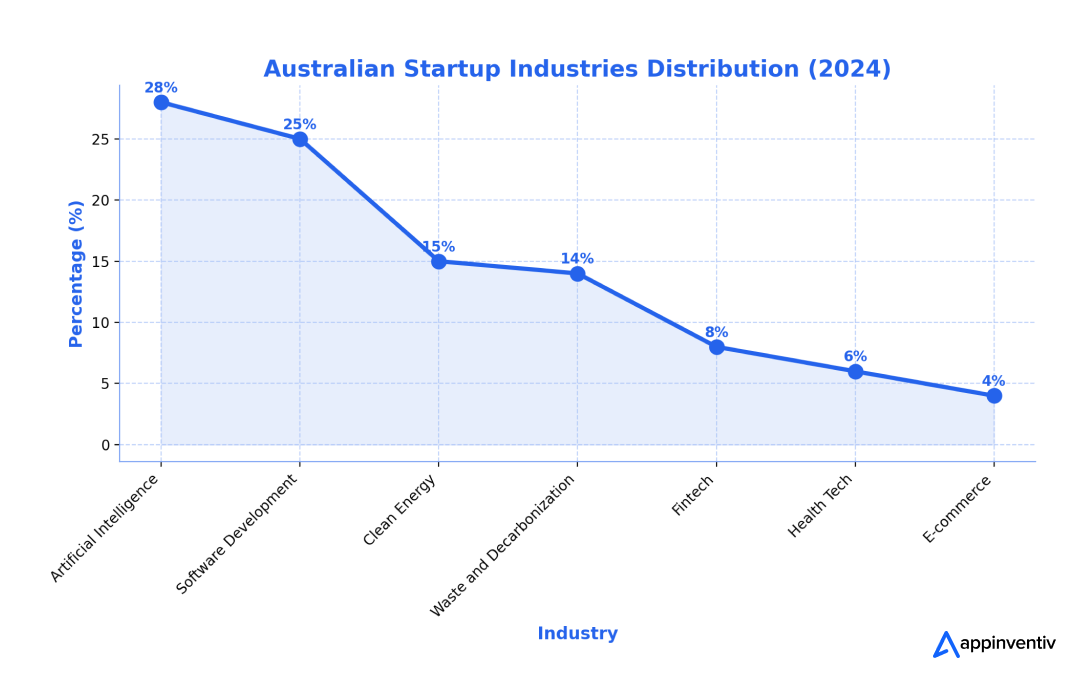
Investment Landscape
Venture capital investment in Australian tech startups has reached unprecedented levels. Building on prior years’ momentum, annual VC funding now surpasses $10 billion, with mega-rounds (funding rounds exceeding $100 million) becoming increasingly common. Sectors and business ideas in Australia, such as fintech, healthtech, climate tech, and artificial intelligence, are at the forefront of this investment surge.
Despite global economic uncertainties, Australian investors have demonstrated resilience. In 2024, Australian investors’ investment in climate tech startups increased by $237 million compared to 2022, contrasting with a $60 billion decline in global investment during the same period.
Investor Sentiment
The outlook for 2025 is cautiously optimistic. Approximately 74% of investors anticipate higher deal volumes, with stabilizing valuations and an increased focus on sustainable growth models. This sentiment is echoed by startups, with 80% expressing optimism about their prospects for the year ahead.
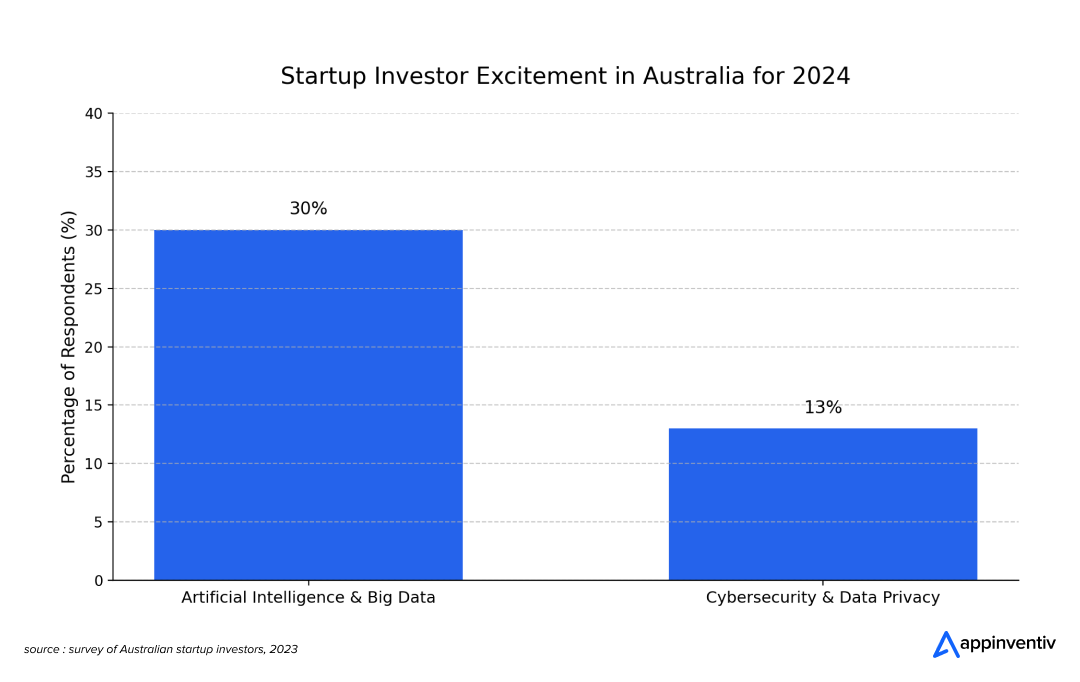
Emerging Trends
Several key trends are shaping the Australian startup ecosystem and IT business ideas:
- Artificial Intelligence: Over 40% of Australian tech startups integrate AI into their core products and services to enhance offerings and profitability.
- Sustainability and Climate Tech: There is a growing emphasis on green technologies and sustainable practices, with several startup business idea models developing towards renewable energy, sustainable agriculture, and carbon capture.
- HealthTech: Startups are leveraging healthcare software development in Australia to revolutionize care delivery, diagnostics, and treatment, attracting significant investment
Challenges and Considerations
While the ecosystem is thriving, challenges remain. Industry leaders emphasize the importance of prudent financial management and caution against excessive capital raising, which can lead to equity dilution and operational complications.
Additionally, startups, even those built on profitable startup business ideas in 2025 in Australia, should focus on sustainable growth models and clear paths to profitability to attract and retain investor interest.
Australia’s startup market in 2025 is marked by robust investment activity, technological innovation, and a focus on sustainability. Entrepreneurs and investors alike are navigating this dynamic landscape with cautious optimism, making positioning of the ecosystem for continued growth and global influence a key part of their innovative startup ideas in Australia.
As part of the Australian startup ecosystem for over five years now, our team has gathered massive insights into types of startup business ideas that are return-friendly.
Below, we have categorized those ideas into sub-sections.
Best Low-Investment Tech Startup Ideas
For entrepreneurs looking to enter the tech industry with good business ideas in Australia that require minimal capital, several software and digital business models emerge with low upfront investment while offering high scalability. These startup company ideas are built to leverage existing platforms, cloud infrastructure, and automation to minimize costs.
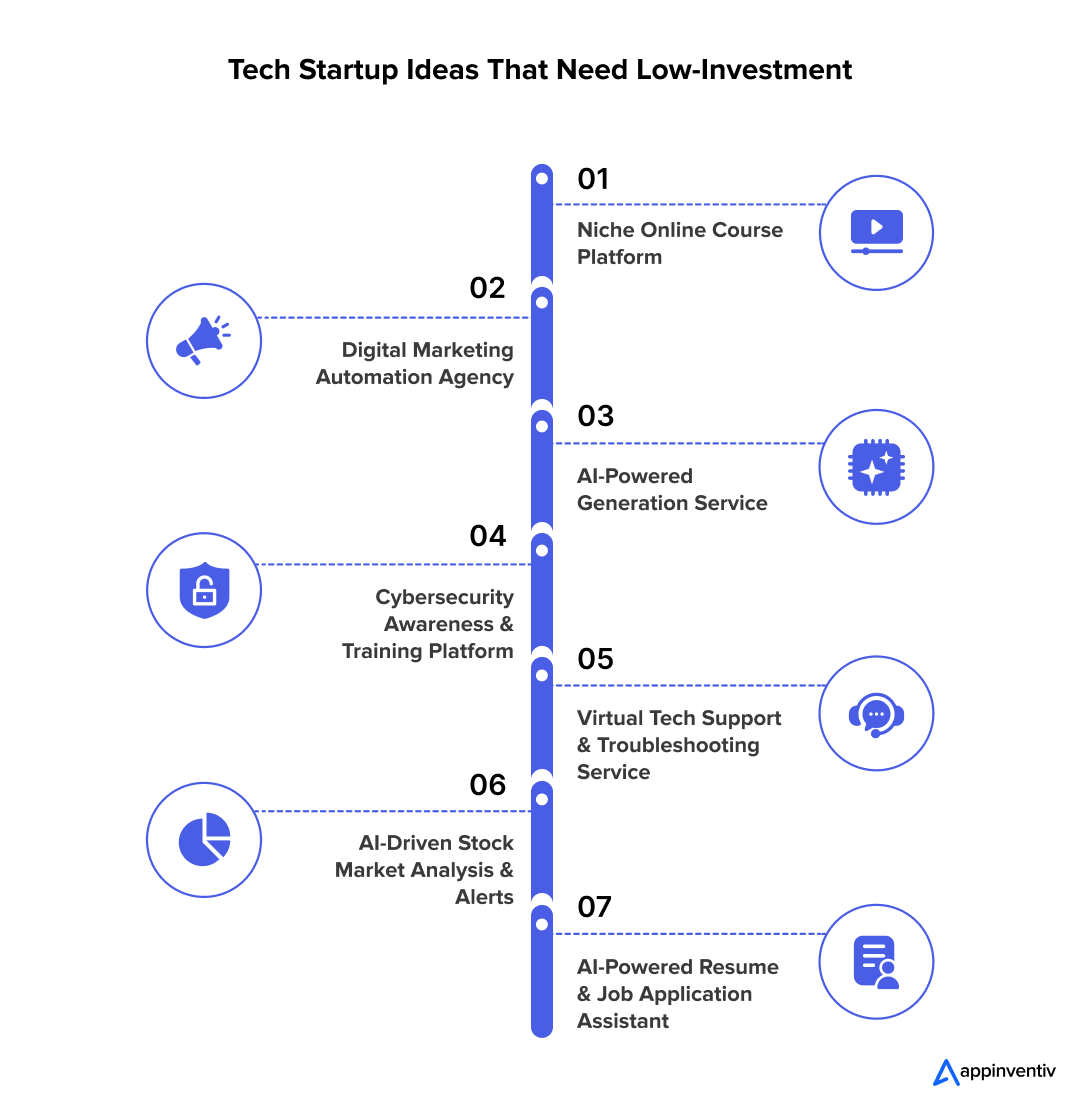
Niche Online Course Platform
With the rise of digital learning, creating a platform that hosts specialized online courses in fields like coding, digital marketing, or cybersecurity can be highly profitable. Platforms like Teachable and Thinkific allow entrepreneurs to start with minimal investment.
Estimated Startup Cost: AUD 5,000 – 20,000
Real Example: Gurushala
Gurushala, a learning platform launched by Vodafone India Foundation and run by Pratham Education Foundation, has partnered with Appinventiv to enhance digital learning for students and educators.
They aim to create a user-friendly platform offering free study materials, self-paced courses, and interactive tools. Appinventiv developed innovative features for teacher collaboration, such as a teacher reward system, a “Competitions” section, and the “Gurushala Staffroom.”
This solid platform welcomed a hefty crew of over 150,000 students and educators, raked in a cool $2.1 million, and grabbed the spotlight in 20+ national news spots.
Digital Marketing Automation Agency
Instead of building software from scratch, entrepreneurs can use existing automation tools (like Zapier, HubSpot, or Mailchimp) to offer small businesses end-to-end digital marketing automation services.
Estimated Startup Cost: AUD 8,000 – 25,000
AI-Powered Content Generation Service
With the increasing demand for high-quality content, AI-driven writing tools like GPT-powered text generation and SEO content optimization can provide a service-based business model with minimal upfront costs.
Estimated Startup Cost: AUD 7,000 – 20,000
Cybersecurity Awareness & Training Platform
Cyber threats are growing, and businesses need employees trained in best practices. Thus, the best startup business ideas could be a digital platform offering interactive cybersecurity awareness training, phishing simulations, and compliance tracking – a low-cost entry into the tech space.
Estimated Startup Cost: AUD 10,000 – 30,000
Virtual Tech Support & Troubleshooting Service
Many small businesses and individuals struggle with tech-related issues but cannot afford in-house IT teams. Offering a remote tech support service specializing in software troubleshooting, cloud setup, and security enhancements can be one of the best business startup ideas in the cost-effective category.
Estimated Startup Cost: AUD 5,000 – 15,000
AI-Driven Stock Market Analysis & Alerts
Retail investors increasingly seek AI-powered tools that analyze stock trends, predict market movements, and send automated trade alerts. A cloud-based platform with minimal infrastructure requirements can be one of the viable low-investment technology business ideas for startups.
Estimated Startup Cost: AUD 12,000 – 35,000
AI-Powered Resume & Job Application Assistant
Job seekers often struggle with optimizing their resumes and cover letters. Software startup ideas around an AI-driven SaaS tool that provides real-time suggestions, keyword optimization, and automated formatting could cater to the huge market of job applicants and recruiters alike.
Estimated Startup Cost: AUD 10,000 – 30,000
Real Example: JobGet
JobGet teamed up with Appinventiv to increase recruitment for blue-collar job hunters. Together, they aimed to make a cool AI-driven mobile app. They tackled the long wait times for job placements—between 70 and 93 days—by creating a space where folks looking for work and those hiring could chat, set up meetings, and do video interviews.
Appinventiv integrated AI-driven features, such as location-based matching and resume-like user profiles, slashing job search time to days.
Outcome: JobGet’s streamlined process earned them an early $2.1 million seed investment and, later, a hefty $52 million during their Series B. They bagged the “MIT Inclusive Innovation Award” and MassChallenge’s top prize.
Best High-Investment, High-Return Tech Startup Ideas
For entrepreneurs willing to invest significant capital, these high-risk, high-reward startup business ideas in Australia have the potential for substantial long-term returns. These ventures often require strong technical expertise, regulatory compliance, and advanced infrastructure, but can scale rapidly once established.
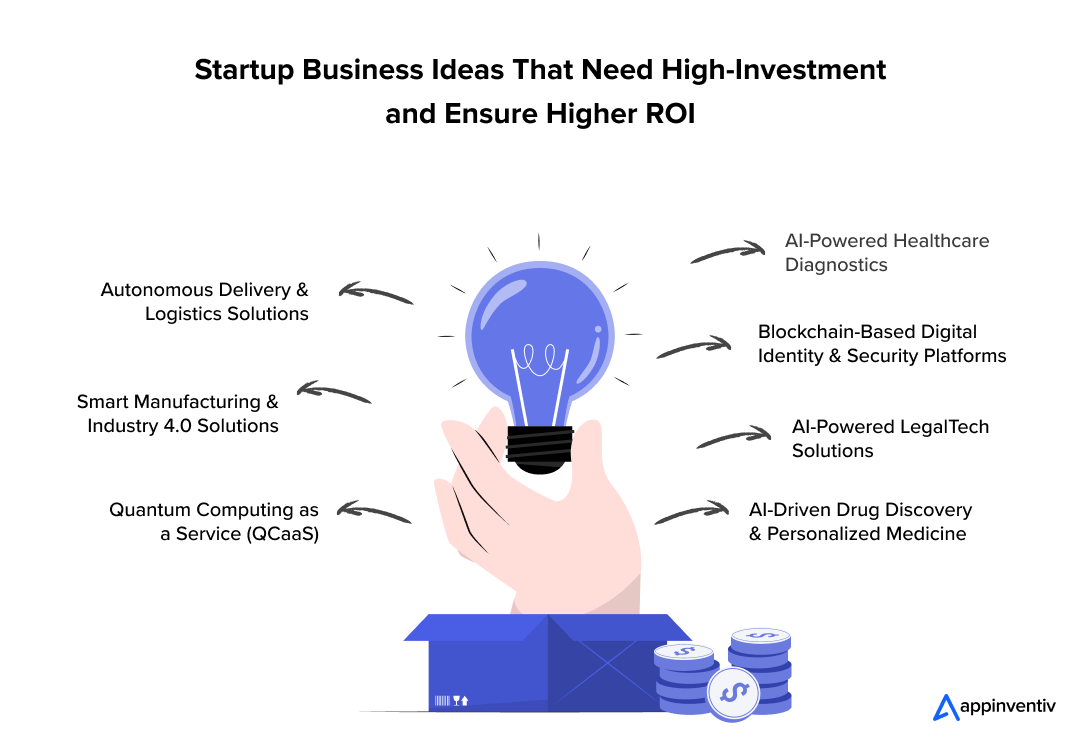 AI-Powered Healthcare Diagnostics
AI-Powered Healthcare Diagnostics
AI in medical diagnosis can assist doctors in detecting diseases like cancer, cardiovascular conditions, and neurological disorders with high accuracy. By integrating machine learning with medical imaging, startups can revolutionize healthcare diagnostics and patient care, proving to be one of the best business ideas in Brisbane.
Estimated Startup Cost: AUD 500,000 – 2,000,000
Autonomous Delivery & Logistics Solutions
The rise of e-commerce has increased demand for automated last-mile delivery solutions, including drone-based delivery and AI-driven logistics platforms. AI in logistics reduces operational costs and improves delivery efficiency.
Estimated Startup Cost: AUD 700,000 – 3,000,000
Blockchain-Based Digital Identity & Security Platforms
With increasing concerns over data privacy, blockchain-based identity verification solutions offer secure authentication for financial institutions, government services, and enterprises. Platforms around these business ideas in Sydney can be built to provide decentralized security, reducing fraud risks.
Estimated Startup Cost: AUD 600,000 – 2,500,000
Smart Manufacturing & Industry 5.0 Solutions
Factories are integrating IoT, AI, and robotics to optimize production lines, predictive maintenance, and supply chain automation. Industry 5.0 ensures the development of smart manufacturing platforms that offer real-time analytics and automated workflows, which can yield massive returns when you look at this category of tech startup ideas in Australia.
Estimated Startup Cost: AUD 800,000 – 5,000,000
AI-Powered LegalTech Solutions
Legal firms and businesses need AI-driven tools for contract analysis, compliance tracking, and legal research automation. AI startup ideas, like developing a platform streamlining legal processes, can avoid compliance violations while attracting law firms and enterprises globally.
Estimated Startup Cost: AUD 400,000 – 1,500,000
Quantum Computing as a Service (QCaaS)
Quantum computing is set to revolutionize finance, pharmaceuticals, and cybersecurity industries. While requiring heavy investment in infrastructure and research, tech business ideas offering cloud-based quantum computing services can dominate this emerging sector.
Estimated Startup Cost: AUD 2,000,000 – 10,000,000
AI-Driven Drug Discovery & Personalized Medicine
Pharmaceutical companies invest billions in R&D, and AI can accelerate drug discovery by analyzing complex biological data. As AI in healthcare is one of the most popular business ideas in Australia, medical service providers who leverage AI for precision medicine, clinical trial optimization, or biomarker identification can see high returns.
Estimated Startup Cost: AUD 1,000,000 – 5,000,000
Best Government Grant-Friendly Startup Business Ideas In Australia
The Australian government offers grants and funding programs to support IT business ideas and tech startups. These grants often focus on innovation, sustainability, and emerging technologies that align with national priorities. Some startup ideas qualify for government funding and grant application sources.
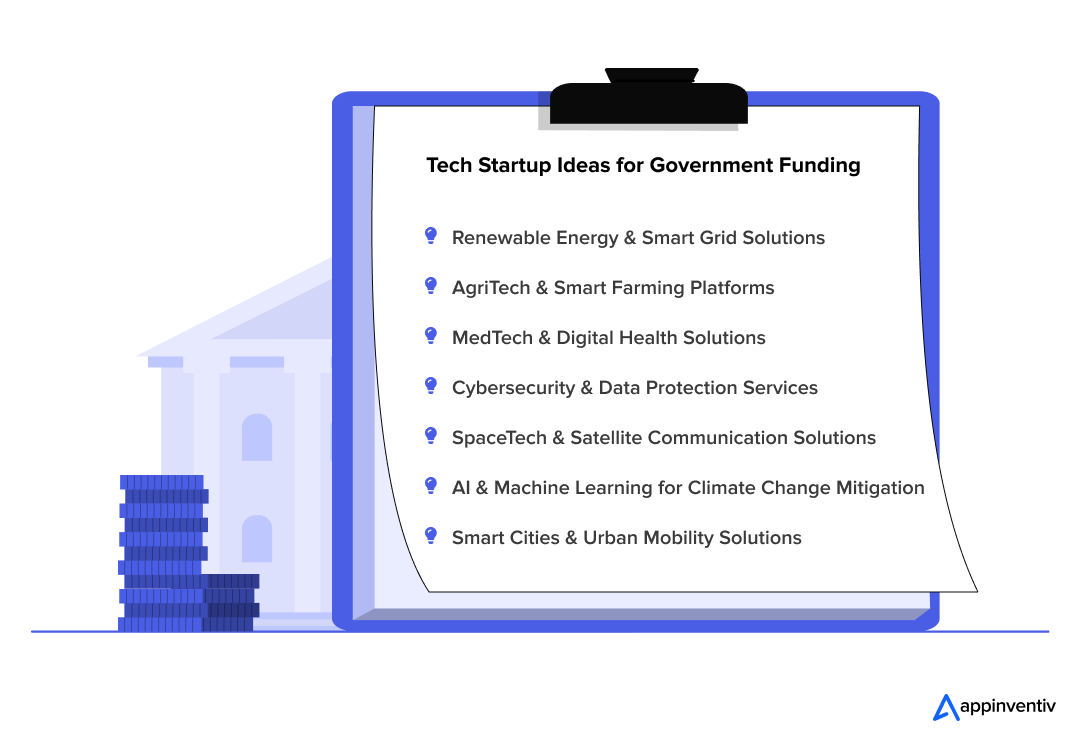 Renewable Energy & Smart Grid Solutions
Renewable Energy & Smart Grid Solutions
Australia is pushing for a cleaner energy future. Startup business ideas models built around solar energy optimization software, AI-driven energy distribution platforms, and smart grid solutions can qualify for renewable energy grants.
Estimated Startup Cost: AUD 300,000 – 2,000,000
Where to Apply:
AgriTech & Smart Farming Platforms
Precision agriculture, AI-powered crop monitoring, and farm automation solutions can improve productivity and sustainability in farming, making them not just one of the most profitable startup business ideas in Australia but also eligible for government funding.
Estimated Startup Cost: AUD 250,000 – 1,500,000
Where to Apply:
MedTech & Digital Health Solutions
Innovative startup ideas in Australia, such as the creation of AI-driven diagnostics, telehealth platforms, and digital health record solutions, can receive funding to improve healthcare accessibility and efficiency.
Estimated Startup Cost: AUD 500,000 – 3,000,000
Where to Apply:
Cybersecurity & Data Protection Services
With cybersecurity threats on the rise, the Australian government is funding good business ideas in Australia focused on developing innovative cybersecurity solutions, including AI-driven threat detection and secure cloud platforms.
Estimated Startup Cost: AUD 400,000 – 2,500,000
Where to Apply:
SpaceTech & Satellite Communication Solutions
Startups working on satellite-based internet, Earth observation technology, and AI-driven space data analytics can benefit from government-backed space exploration initiatives.
Estimated Startup Cost: AUD 1,000,000 – 5,000,000
Where to Apply:
AI & Machine Learning for Climate Change Mitigation
Artificial intelligence is being leveraged for climate monitoring, predictive environmental analytics, and disaster management, making it a priority for government funding.
Estimated Startup Cost: AUD 500,000 – 2,000,000
Where to Apply:
Smart Cities & Urban Mobility Solutions
Startup company ideas for developing AI-driven traffic management, optimization of electric vehicle infrastructure, and IoT-enabled smart city solutions can secure urban development grants.
Estimated Startup Cost: AUD 600,000 – 3,000,000
Where to Apply:
Best SaaS Startup Ideas
The Software-as-a-Service market in Australia is experiencing rapid growth, fueled by increasing digital transformation across industries. Businesses are shifting to cloud-based solutions that enhance efficiency, reduce costs, and improve accessibility. Here are some of the most promising SaaS startup ideas for aspiring entrepreneurs.
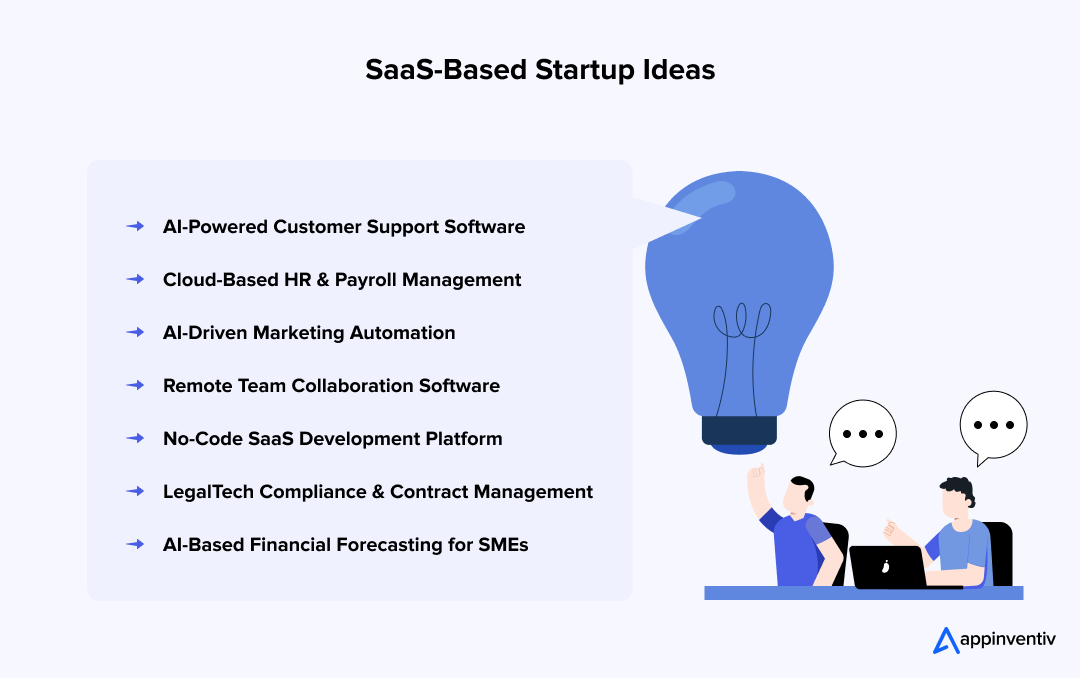
AI-Powered Customer Support Software
With businesses prioritizing customer experience, AI-driven support platforms that automate responses, manage queries, and provide analytics are in high demand. These software startup ideas can be built upon to leverage natural language processing and machine learning to enhance customer interactions while reducing costs.
Estimated Startup Cost: AUD 80,000 – 300,000
Cloud-Based HR & Payroll Management
HR and payroll management are challenges for many Australian SMEs. A cloud-based solution that automates payroll processing, tax calculations, and compliance tracking can significantly ease HR burdens and enhance efficiency while proving to be one of the best startup business ideas.
Estimated Startup Cost: AUD 100,000 – 250,000
AI-Driven Marketing Automation
Marketing teams are looking for smarter ways to engage customers. A SaaS platform that automates email campaigns, social media posting, and customer segmentation using AI startup ideas like generative insights can help businesses increase conversions with minimal manual effort.
Estimated Startup Cost: AUD 120,000 – 350,000
Remote Team Collaboration Software
With hybrid and remote work becoming the norm, businesses require more advanced collaboration tools. SaaS startup ideas built on real-time project management, file sharing, and AI-powered productivity tracking can be a game-changer.
Estimated Startup Cost: AUD 150,000 – 400,000
No-Code SaaS Development Platform
The demand for customized business applications is rising, , and it has become essential for businesses to hire mobile app developers in Australia. One of the best business startup ideas that entrepreneurs have started considering is a no-code SaaS development platform that allows non-technical users to build apps tailored to their needs, democratizing software development.
Estimated Startup Cost: AUD 200,000 – 500,000
LegalTech Compliance & Contract Management
Legal teams struggle with contract management and regulatory compliance. A SaaS tool that automates contract creation, monitors compliance risks, and provides AI-driven legal insights can streamline operations for law firms and corporations.
Estimated Startup Cost: AUD 120,000 – 350,000
AI-Based Financial Forecasting for SMEs
Many small businesses lack the expertise to manage finances effectively. A financial forecasting SaaS that leverages AI to analyze cash flow, predict revenue, and offer budget recommendations can provide much-needed support to SMEs, while being one of the best technology business ideas for startups.
Estimated Startup Cost: AUD 100,000 – 300,000
Best Sustainable & Green Tech Startup Ideas
With a growing focus on climate change and environmental sustainability, green business ideas in Brisbane are gaining traction in Australia. These businesses develop innovative solutions to reduce carbon footprints, improve resource efficiency, and promote clean energy. Here are some of the top sustainable tech startup ideas.
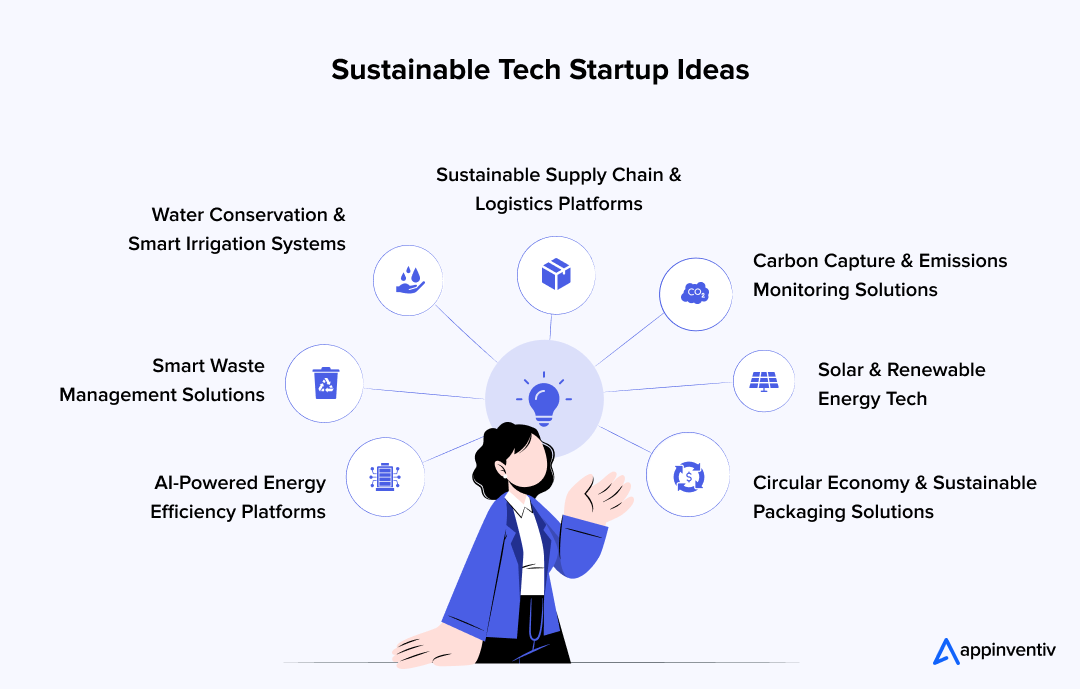
AI-Powered Energy Efficiency Platforms
Technologies are reshaping the renewable energy industry in Australia. However, startups leveraging AI to optimize energy consumption in homes and businesses can significantly reduce electricity costs and carbon emissions. These business ideas in Sydney analyze real-time data to recommend energy-saving strategies.
Estimated Startup Cost: AUD 300,000 – 1,500,000
Smart Waste Management Solutions
The waste management software system and AI-driven recycling platforms help cities and businesses manage waste efficiently, ensuring higher recycling rates and reduced landfill contributions.
Estimated Startup Cost: AUD 200,000 – 1,200,000
Solar & Renewable Energy Tech
Startup business ideas in Australia, such as AI-driven solar panel optimization, battery storage solutions, and smart microgrids, allow better renewable energy adoption.
Some existing businesses are making solar power more efficient and cost-effective with the assistance of solar panel monitoring app development.
Estimated Startup Cost: AUD 500,000 – 2,500,000
Sustainable Supply Chain & Logistics Platforms
AI-driven logistics-based tech startup ideas in Australia that can optimize routes and reduce fuel consumption can contribute to lower emissions. These solutions help e-commerce and transport companies meet sustainability goals.
Estimated Startup Cost: AUD 400,000 – 2,000,000
Carbon Capture & Emissions Monitoring Solutions
With stricter environmental regulations, startups providing AI-powered carbon tracking and emissions monitoring tools can help industries comply with sustainability standards and reduce their carbon footprints. Energy tech companies also offer optimally priced white-label carbon management software development.
Estimated Startup Cost: AUD 600,000 – 3,000,000
Water Conservation & Smart Irrigation Systems
IoT-enabled smart irrigation and water management systems use data-driven insights to reduce water waste in agriculture and urban environments, ensuring sustainable water usage.
Estimated Startup Cost: AUD 250,000 – 1,500,000
Circular Economy & Sustainable Packaging Solutions
The execution and development of biodegradable packaging, AI-driven material recycling platforms, and sustainable product lifecycle management tech business ideas can help businesses transition towards a circular economy.
Estimated Startup Cost: AUD 350,000 – 2,000,000
Best AI & Automation Tech Startup Ideas
Artificial Intelligence and automation are transforming industries worldwide. In Australia, AI-driven startups are seeing increased investment and adoption across the healthcare, finance, and logistics sectors. Here are some AI- and automation-focused business ideas in Australia and their estimated costs.
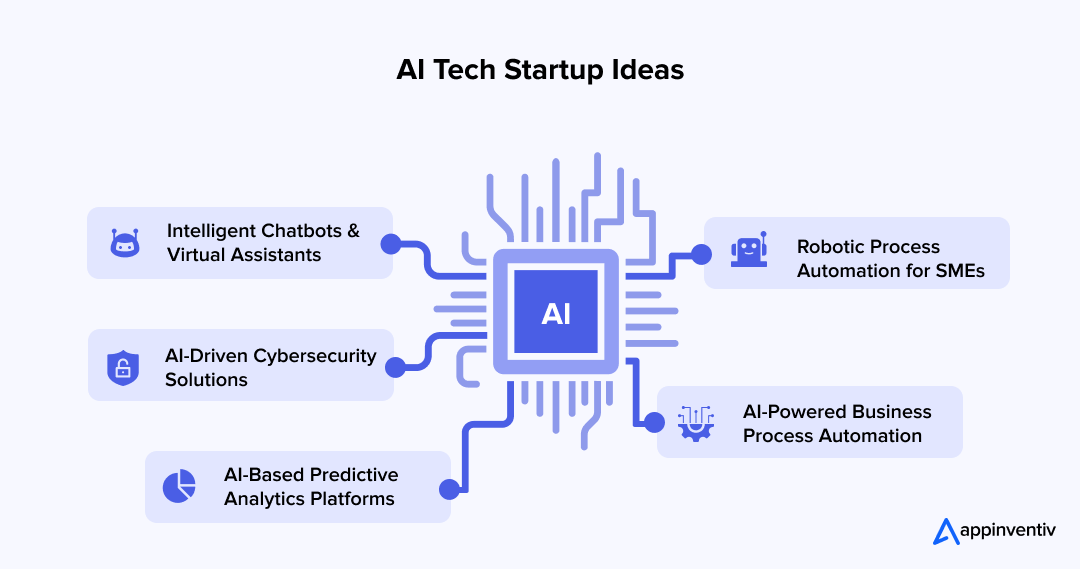
AI-Powered Business Process Automation
Companies seek AI-driven solutions to automate repetitive business processes such as customer support, data entry, and HR management. IT business ideas, developing low-code or no-code automation platforms, can gain a competitive edge.
Estimated Startup Cost: AUD 500,000 – 2,500,000
AI-Driven Cybersecurity Solutions
With increasing cyber threats, AI-powered security platforms that detect and prevent cyberattacks in real-time are in high demand. These platforms use machine learning to identify vulnerabilities and automate threat response.
Estimated Startup Cost: AUD 700,000 – 3,000,000
Intelligent Chatbots & Virtual Assistants
Chatbots, focused innovative startup ideas Australia aimed at customer service, sales, and personal assistance, can help businesses improve engagement and operational efficiency. In this space, Voice AI and NLP-based chatbots are particularly gaining traction.
Estimated Startup Cost: AUD 300,000 – 1,500,000
AI-Based Predictive Analytics Platforms
AI-powered predictive analytics tools benefit businesses in retail, healthcare, and finance by forecasting trends, optimizing inventory, and improving risk assessment.
Estimated Startup Cost: AUD 600,000 – 2,500,000
Robotic Process Automation for SMEs
Automation of back-office tasks through RPA tools can help small and medium enterprises increase efficiency and reduce costs. Good business ideas in Australia focused on developing industry-specific RPA solutions have a strong market opportunity.
Estimated Startup Cost: AUD 500,000 – 2,000,000
How to Start a Startup Business in Australia
Plenty of resources cover the basics of launching a company—how to develop technology business ideas for startups, where to find an app development company in Australia, and what software development processes to follow. However, there’s far less guidance on the operational side of starting a business in Australia.
This section covers the critical steps for companies that have already found validated startup business ideas in 2025 in Australia and are looking to navigate legal, financial, and compliance requirements.
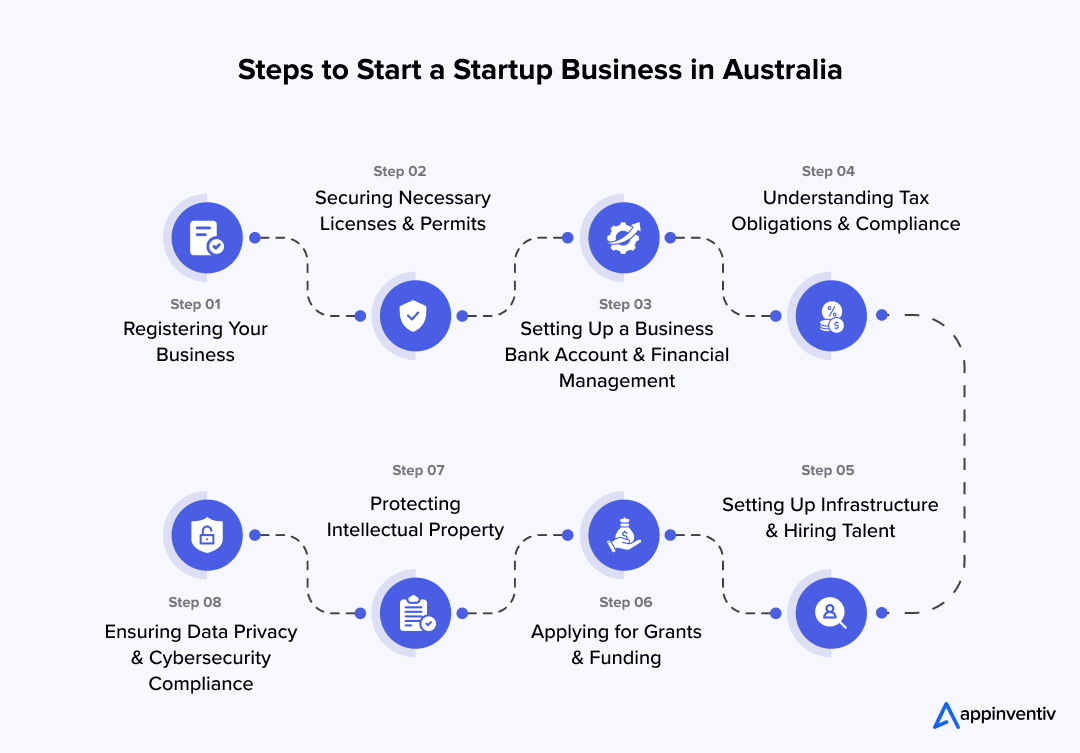
Registering Your Business
To operate legally, you must register your business with the Australian Securities and Investments Commission (ASIC) and obtain an Australian Business Number (ABN). If you plan to trade under a different name, registering a business name is also required.
- Choose a business structure (Sole Trader, Partnership, or Company)
- Register for an ABN through the Australian Business Register (ABR)
- Register your company with ASIC if forming a corporation
Securing Necessary Licenses & Permits
Depending on your industry, you may need specific permits or licenses. For instance, fintech startups may require an Australian Financial Services (AFS) license from ASIC.
- Check the Australian Business Licence and Information Service (ABLIS) for permits.
- Apply for industry-specific licenses.
- Ensure compliance with privacy and data protection laws (if handling user data)
Setting Up a Business Bank Account & Financial Management
A dedicated business bank account is essential for financial management. Additionally, setting up accounting software can help track revenue, expenses, and tax obligations.
- Open a business account with an Australian bank
- Register for Goods and Services Tax (GST) if turnover exceeds AUD 75,000
- Use accounting software like Xero or MYOB for financial tracking
Understanding Tax Obligations & Compliance
Australia has strict tax regulations, and businesses must comply with tax requirements, including company tax, GST, and payroll tax.
- Register for a Tax File Number (TFN) with the Australian Taxation Office (ATO)
- Ensure compliance with superannuation obligations if hiring employees
- Understand the R&D Tax Incentive program for tech startups
Setting Up Infrastructure & Hiring Talent
It is crucial to choose the right location (if needed), hire employees, and set up necessary IT infrastructure.
- Decide between a physical office, a co-working space, or remote operation
- Hire through platforms like Seek, LinkedIn, or specialized tech job boards
- Set up cloud-based infrastructure (AWS, Google Cloud, or Azure)
Applying for Grants & Funding
Australia offers multiple funding programs for tech startups, including grants, accelerators, and venture capital options.
- Explore government grants (e.g., Accelerating Commercialisation, R&D Tax Incentive)
- Apply to startup incubators and accelerators (e.g., Startmate, Stone & Chalk)
- Pitch to venture capital firms and angel investors
Protecting Intellectual Property
Tech startups should secure their innovations through patents, trademarks, and copyrights.
- Register trademarks with IP Australia
- Apply for patents if the startup involves novel technology
- Ensure contracts include IP protection clauses for employees and partners
Ensuring Data Privacy & Cybersecurity Compliance
Australian businesses must comply with the Privacy Act 1988 and other data protection regulations.
- Implement cybersecurity measures such as data encryption and firewalls
- Follow the Australian Privacy Principles (APPs) when handling customer data
- Conduct regular security audits to prevent breaches
By following these operational steps, tech startups in Australia can establish a strong foundation and ensure compliance with legal, financial, and cybersecurity standards.
How Can Appinventiv Help in Your Journey?
At Appinventiv, we are passionate about supporting Australian startups and understanding the unique challenges local businesses face in their early stages. As a partner, we aim to be more than just a bespoke mobile app development company in Australia; we are dedicated to your success from day one.
We pride ourselves on our hands-on approach, offering tailored services designed specifically for startups. Unlike larger firms, we take the time to understand your business vision, market needs, and the intricacies of your startup’s goals. By collaborating closely with you, we ensure that our solutions are aligned with your objectives and help set the foundation for long-term growth.
Our process begins with a deep dive into your tech startup ideas in Australia, helping you define the scope, technology stack, and features needed to meet market demands. As Australian startup specialists, we guide you through every stage, from initial planning to app launch, ensuring that your app meets and exceeds your expectations.
With us, you’re not just building an app but a long-term business solution designed to thrive in the competitive Australian startup landscape. Contact us now!
FAQs
Q. How to start a business in Australia?
A. Starting a business in Australia requires registering with the Australian Securities and Investments Commission (ASIC) and obtaining an Australian Business Number (ABN). You’ll need to decide on your business structure, whether it’s a sole trader, partnership, or company. Additionally, ensure you register for GST if your turnover exceeds the threshold and secure any required licenses. It’s also crucial to comply with local laws and regulations related to taxes and industry-specific requirements.
Q. Which business is best in Australia?
A. The best business ideas in Australia largely depend on your skill set and market needs. However, industries like technology (SaaS, AI, app development), health tech, and e-commerce have seen substantial growth. Service-based businesses such as digital marketing, IT solutions, and consulting are also thriving, as well as eco-friendly startups focusing on sustainability, which is becoming increasingly popular in Australia.
Q. Which business is most profitable in Australia?
A. The most profitable startup business ideas in Australia often lie in sectors such as technology, healthcare, and real estate. AI, automation, and SaaS businesses are seeing high demand due to their scalability. Other profitable industries include construction, renewable energy, and subscription-based services. Additionally, industries that cater to sustainability and green energy are gaining significant traction and offering substantial profit potential.
Q. How to find startup ideas?
A. To find tech startup ideas in Australia, start by identifying problems or challenges people face in everyday life and thinking about how you could solve them. Engaging with your target market, conducting thorough research into emerging trends, and exploring gaps in existing industries are helpful. Networking, brainstorming with others, and seeking feedback can also help spark new ideas with great potential.
Q. What types of startup business ideas are profitable to launch in Australia in 2025?
A. In 2025, profitable business ideas in Australia are expected to be in the tech, sustainability, and health sectors. AI-powered services, automation, and SaaS platforms will continue to thrive, as will green tech and sustainable products. Health-related startups like telemedicine and wellness solutions will see demand, while e-commerce, subscription models, and industries like fintech and edtech will remain strong contenders.
Product Development & Engineering
IT Managed & Outsourcing
Consulting Services
Data Services
Didn't find what you're looking for? Let us know your needs, and we'll tailor a solution just for you.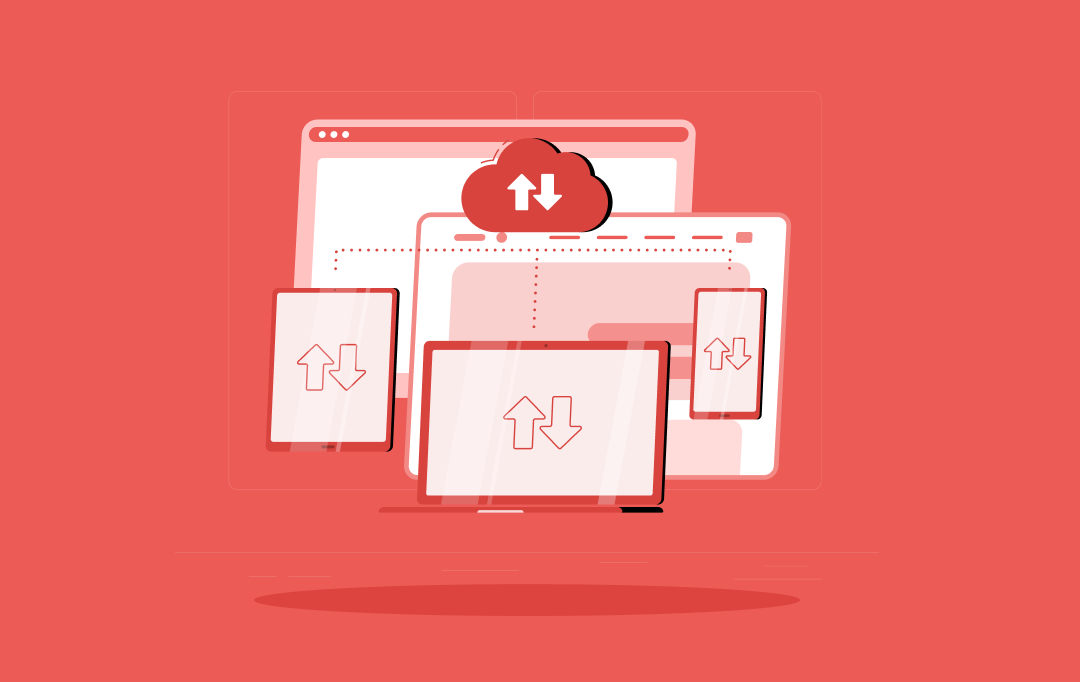
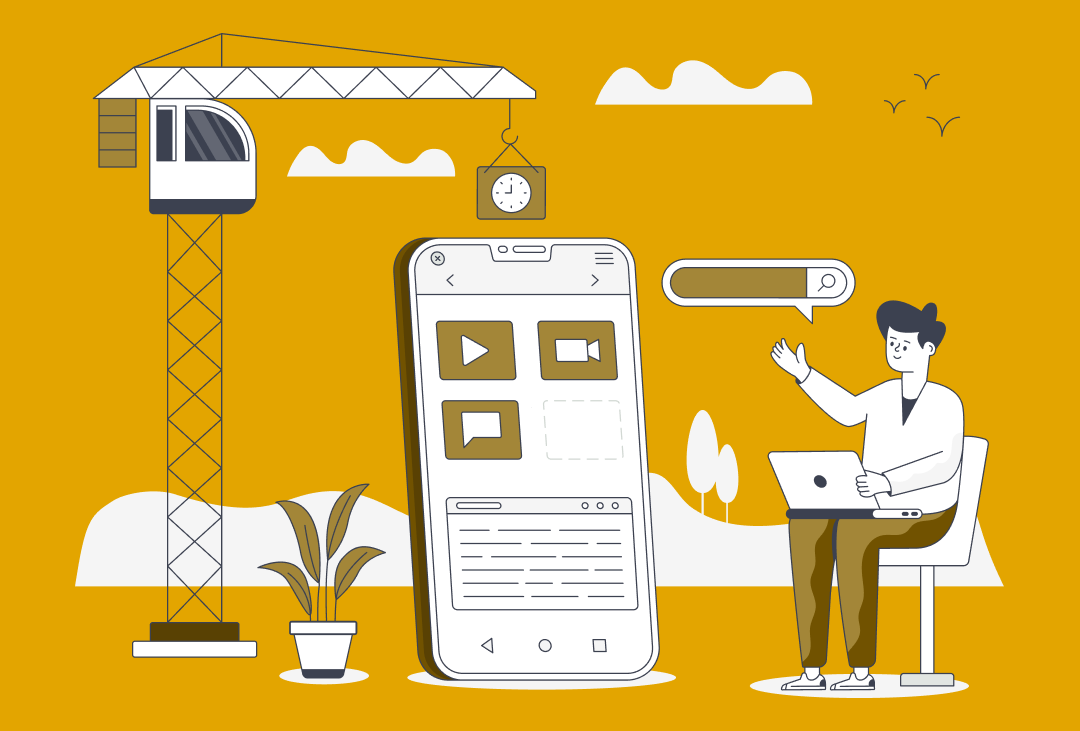



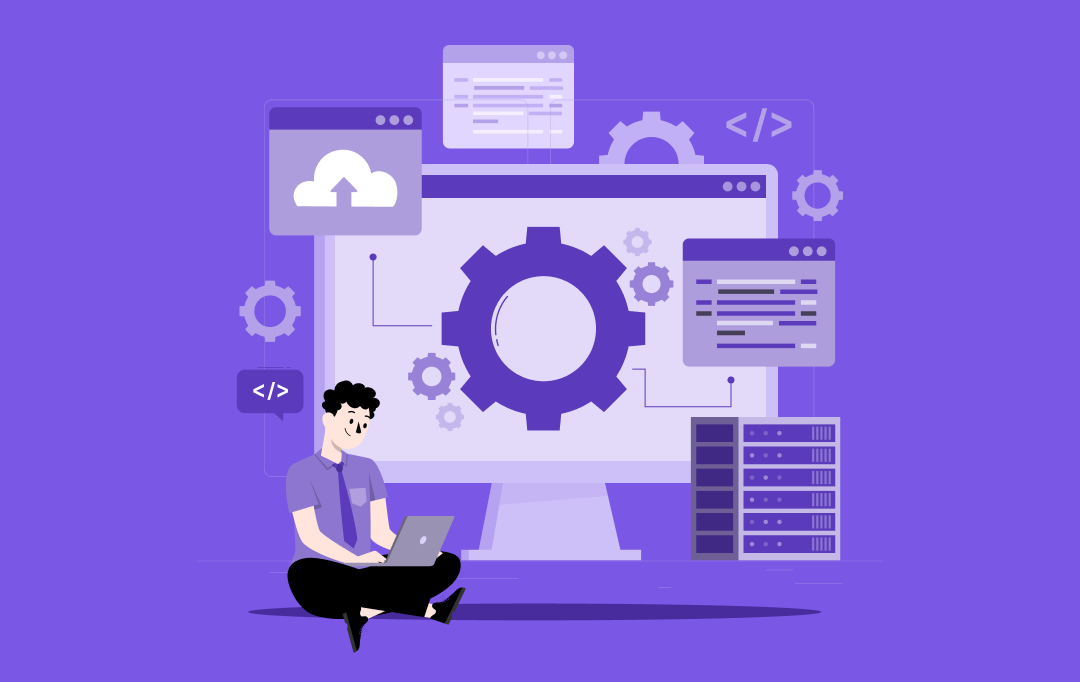















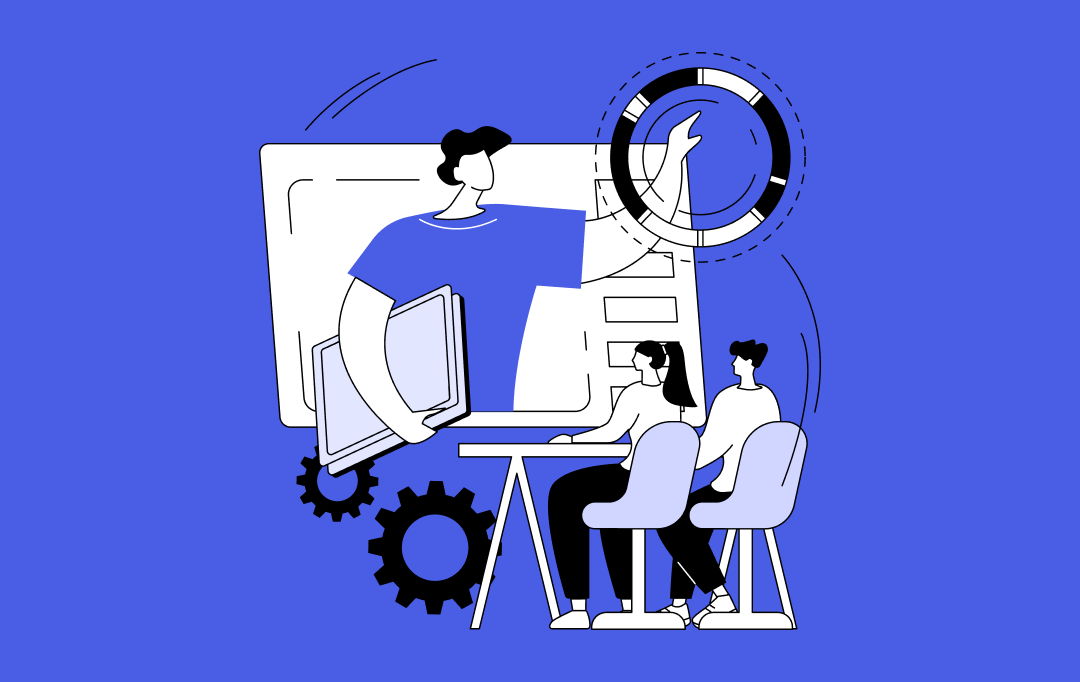




 AI-Powered Healthcare Diagnostics
AI-Powered Healthcare Diagnostics Renewable Energy & Smart Grid Solutions
Renewable Energy & Smart Grid Solutions







